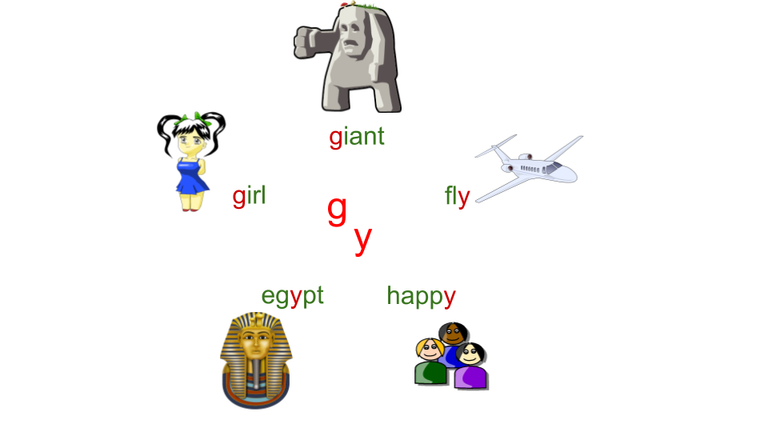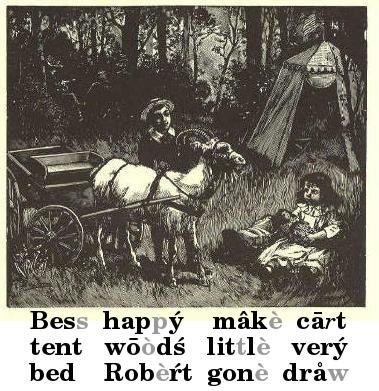Can we turn sight words regular?
Sőmè Ėnglish letterś havè morè τhan one (wun) sound

citations to the images forthcoming (in the comments)
Sight words
Following is a list of the 'Dolch Sight Words' as listed on Wikipedia. 'Sight words' are promoted by some educationalists as words that should not be learned as a sequence of letters, but learned together as a whole group, like recognising a picture. This avoids problems decoding some of the very common irregular English words. It also encourages learners to memorise words as units. This promotes fluency.
Pre-primer: (40 words) a, and, away, big, blue, can, come, down, find, for, funny, go, help, here, I, in, is, it, jump, little, look, make, me, my, not, one, play, red, run, said, see, the, three, to, two, up, we, where, yellow, you
Primer: (52 words) all, am, are, at, ate, be, black, brown, but, came, did, do, eat, four, get, good, have, he, into, like, must, new, no, now, on, our, out, please, pretty, ran, ride, saw, say, she, so, soon, that, there, they, this, too, under, want, was, well, went, what, white, who, will, with, yes
1st Grade: (41 words) after, again, an, any, as, ask, by, could, every, fly, from, give, giving, had, has, her, him, his, how, just, know, let, live, may, of, old, once, open, over, put, round, some, stop, take, thank, them, then, think, walk, were, when
2nd Grade: (46 words) always, around, because, been, before, best, both, buy, call, cold, does, don't, fast, first, five, found, gave, goes, green, its, made, many, off, or, pull, read, right, sing, sit, sleep, tell, their, these, those, upon, us, use, very, wash, which, why, wish, work, would, write, your
3rd Grade: (41 words) about, better, bring, carry, clean, cut, done, draw, drink, eight, fall, far, full, got, grow, hold, hot, hurt, if, keep, kind, laugh, light, long, much, myself, never, nine, only, own, pick, seven, shall, show, six, small, start, ten, today, together, try, warm
Nouns: (95 words) apple, baby, back, ball, bear, bed, bell, bird, birthday, boat, box, boy, bread, brother, cake, car, cat, chair, chicken, children, Christmas, coat, corn, cow, day, dog, doll, door, duck, egg, eye, farm, farmer, father, feet, fire, fish, floor, flower, game, garden, girl, good-bye, grass, ground, hand, head, hill, home, horse, house, kitty, leg, letter, man, men, milk, money, morning, mother, name, nest, night, paper, party, picture, pig, rabbit, rain, ring, robin, Santa Claus, school, seed, sheep, shoe, sister, snow, song, squirrel, stick, street, sun, table, thing, time, top, toy, tree, watch, water, way, wind, window, wood
Some words are already regular (ignore the marking for the moment)
| regular | questionable | irregular |
|---|---|---|
| a, and, big, can, help, in, it, jump, not, red, run, up | før, lōòk, mâkè, plây, sêè, thrêè, dõwn | áwây, blüè, cőmè, fînd, funný, gô, hėŕè, Î, iś, littlè, mê, mŷ, one (wun), sãìd, τhé, tó/tö, twö, wê, wheŕè, yellôw, yöù |
Marking long vowels, silent vowels, and clipped vowels
We could add marks to indicate when a letter is not taking its normal sound. For example, long vowels (when a vowel is pronounced like its name) could be marked with a circumflex - âêîôû; silent vowels by a Grave accent - àèìòù; and clipped vowels by an Acute acccent - áéíóú.
Now we have:
| regular | questionable | irregular |
|---|---|---|
| a, and, áwây, big, can, fînd, gô, help, Î, in, it, jump, littlè, mâkè, mê, not, plây, red, run, sêè, thrêè, tó, up, wê, yellôw | før, lōòk, dõwn | blüè, cőmè, funný, hėŕè, iś, mŷ, one (wun), sãìd, τhé, tö, twö, wheŕè, yöù |
| am, at, âtè, bê, black, but, câmè, did, êàt, get, havè, hê, lîkè, must, nô, on, ran, rîdè, sây, well, went, whîtè, whö, will, yes | åll, ārè, brõwn, dö, føùŕ, gōòd, nëw, nõw, õυŕ, õυt, såw, ŝħê, söòn, τhat, τhey, τhis, töò, undèŕ, whîtè, wiτh | dö, plêàśè, prėttý, want (wont), was (woś), whát, whö |
What should we do about regular spelling patterns like 'ea', 'sh', 'ch', 'th', 'oo', 'ow' ...
Some groups of letters have regular sounds. The 'sh' in 'shop', and the 'ch' in 'child', for example. We have two choices we could mark these letters individually as in 'ŝħop', 'ŝure', or 'ŝugar' or teach the pattern 'sh' . 'Shop' is now regular, but 'sure', 'tissue', ... , and 'sugar' are no longer regular unless we introduce the 'ŝ' anyway.
Perhaps, we could start without teaching 'sh'? Would the learner pick up the 'sh' pattern unconsciously - and we might only point out the pattern once they already know it implicitly?
Lettérâìd
I have developed some open-source (free to use, change, and improve) code that automatically adds marks to irregular words. Letteraid uses a set of marks to indicate when a letter is not making its usual sound. The treatment of letter patterns can be customized to suit the preferences of the user.
Here are some fairytales that demo the system online.
And some books including three McGuffey readers. The original diacritic scheme has been removed and I have replaced it with lettérâìd like in the image below.

More information and tools can be found at this website.
Congratulations @tbuyus! You have completed some achievement on Steemit and have been rewarded with new badge(s) :
Click on any badge to view your own Board of Honor on SteemitBoard.
For more information about SteemitBoard, click here
If you no longer want to receive notifications, reply to this comment with the word
STOPτhey livèd wiτh τheìŕ Mőτhèŕ in a sand-bañk, undèŕnêàth τhé röòt of a verý big fìŕ-trêè.
There is some Beatrix potter here where words can be colored according to the voicing of the letter - use the 'customise letteraid' button - Layout - Color Voicing. This happens on the page above, but not in this comment section. But can be seen by right clicking on the story below and clicking 'open image in new tab'